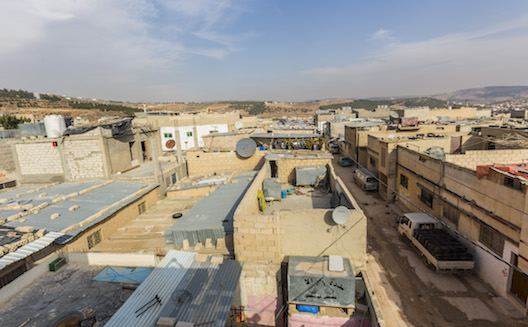Two startups in Palestinian refugee camp picking up where NGOs left off

For years, the mention of “refugees” has drawn pitying donors and sympathetic volunteers, but rarely did it bring stern bosses and business-oriented CEOs into the picture until social entrepreneurship emerged.
The Social Enterprise Project (SEP) and Sitti Soap Company are two companies operating from Jordan’s Gaza Refugee Camp located in Jerash, north of Amman. They are challenging the “victimization” mentality in the camps and introducing a vibrant and durable empowerment model instead.

Both companies sell locally produced items: SEP sells hand-embroidered accessories while Sitti sells all-natural Nabulsi soap.
The two companies grew out of financially-exhausted NGOs.

SEP was created one-and-a-half years ago when an NGO meaning to launch a non-profit program in the camp failed due to a lack of financing. Roberta Ventura, the company’s CEO, took it from there and decided to support the cause through a different format.
Profits generated by SEP are reinvested in the business itself and other developmental activities like English lessons, vocational training and workshops.
Similarly, the idea for Sitti Soap Company started when Noora Sharrab the Cofounder and Regional Director of NGO Hopes for Women in Education realized that the organization needs a more sustainable financial plan than the typical funding cycle. Sharrab together with Jacqueline Sofia who was also starting an NGO but couldn’t collect sufficient funds, founded the company to support and market local produce but also to feed their capacity-building programs.

Sustainability
One of the main problems with humanitarian aid is its unsustainability and dependency it creates. A recent example is last December’s UN World Food Program’s funding crisis, when the organization announced its suspension of food vouchers to 1.7 million Syrian refugees due to financial shortages.
Such inconsistency not only devastates the beneficiaries who have become dependent on support but also the organization itself and the donors who keep on giving without any return.
Jacqueline Sofia, Sitti’s cofounder, believes that donations are inconvenient because “people [donors] always want something in return,” she said during a Skype interview.
“That’s always the way it’s going to be. That’s human nature. Sometimes it’s a bad thing but other times that’s just the way we are. We expect to see return on investment.”
Nawal Arada, one of SEP’s beneficiaries and project manager in the camp, prefers a small, recurring quantity of money over random big amounts. “To find me a job that matters to me, that I would understand and love… is better than having someone remember me once a year by a box of food, or a blanket,” she said during a phone interview with Wamda. “I need a salary to support myself, my children and my expenses. I don’t want to stay in an arbitrary situation. The company [SEP] was a savior,” she added.
Shifting mentality: Don’t give a man a fish, teach him how to fish!

Sustainability is not the only concern about NGOs. It’s the type of support that should also be taken into consideration, meaning it’s not only the source of income that matters. For example, even if a charity organization is financially stable it’s system of donation could result in the beneficiaries’ dependency.
Sofia believes Gaza refugees have been held back for so long because “they’ve been relying on handouts every year”.
“They become dependent on that. It’s like clockwork,” she said. “It’s like conditioning. People are conditioned to expect something to happen so often and at a point they don’t know anything else. It’s not their fault. It’s the fault of the greater system that’s been put in place and they’ve simply been a victim to it.”
Similarly, Roberta Ventura, SEP’s CEO, argues that donations reduce recipients’ ability to plan ahead and control their lives. “Beneficiaries are realizing that aid is not enough,” she said. “It’s kind of humiliating. It takes away a lot of the pride and completely takes away the planning mentality. They live day by day. With social enterprise slowly they can have some visibility for money and they can start making plans.”
Social enterprise and aid are complementary
Regardless of its inconsistent nature, humanitarian aid is inevitable and essential during emergencies. Both Sofia and Ventura agree that donations can treat the symptoms of the problem but social enterprise cures the cause.
Social entrepreneurship can be considered an evolved model of NGOs. It contains the social and humanitarian essence of the non-profit organizations but couples it with generating of profit in order to secure sustainability.
Social enterprises fortunately come to complicate and disrupt the classist dynamic of the “donor/strong/survivor” helping the “recipient/weak/doomed”, because rather than having a superior party giving to an inferior party, in a social enterprise both support each other and exchange resources.


